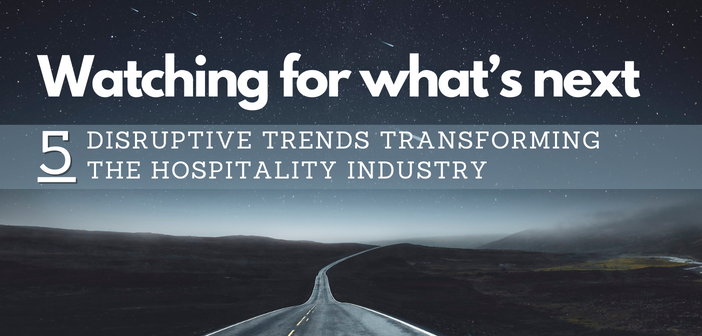Five disruptive trends transforming the hospitality industry
by KEN PATEL
The hospitality industry is always changing and evolving. As a result, hotel owners, investors and CEOs must stay abreast of the most disruptive trends that could affect their business. And, be aware, this disruption isn’t something that will occur years from now, as much of this change is as a result of today’s technology.
To be clear, we aren’t talking about the computer HAL in Stanley Kubrick’s “2001: A Space Odyssey” requiring you to perform a smart eye retinal scan before entering your room, but PropTech – and specifically HotTech –quickly is changing the way hospitality is delivered to our valuable customers.

Here are five of the top disruptive trends to watch out for in 2023 to remain ahead of the curve.
 MOBILE-FRIENDLY BOOKING PLATFORMS
MOBILE-FRIENDLY BOOKING PLATFORMS
The shift towards mobile-friendly booking platforms has been gaining traction over the last handful of years. With travelers increasingly relying on their phones and tablets to browse for hotels, it’s important for hotel companies to make sure their websites are optimized for mobile devices. Additionally, customers now expect an easy check-in and check-out process, as well as a seamless user experience when booking online. In fact, most millennials and gen Zs prefer to not have any human interaction as they’re being granted access to, and depart from, their hotel stay.
As technology advances, automation is becoming increasingly common across all industries and hospitality is no exception. Automated check-in systems allow guests to bypass waiting lines at reception desks by using self-service kiosks or smartphones with a code sent via text message or email. Hotels also can use automated systems to improve customer service, such as providing personalized recommendations based on previous visits or preferences stored in a company database.
 DATA COLLECTION AND PERSONALIZATION
DATA COLLECTION AND PERSONALIZATION
Data is everywhere. And with the evolution of “big data” becoming more accessible than ever, companies can collect detailed information on their customer’s wants and needs. Often, this big data can be paired with predictive algorithms so the company can forecast the customer’s desires and wants, long before the customer is even aware they have the need. This data can be used to personalize guest experiences and tailor offerings to meet the customer’s preferences. Hotels already have begun utilizing this data to create more personalized experiences for their guests, such as offering discounts based on past purchasing behaviors, or providing relevant content recommendations based on their past online searches.
 ARTIFICIAL INTELLIGENCE (AI)
ARTIFICIAL INTELLIGENCE (AI)
AI offers hotels the opportunity to provide more personalized experiences for guests by leveraging data from customer profiles and past visits to suggest amenities or services that would be appealing based on those preferences. Some refer to it as machine learning, and others refer to it as artificial intelligence. But, whatever moniker you place on the strategy, using technology and tools to better understand your customer – and be better prepared for their anticipated wants and needs – is the ultimate goal of any customer-satisfaction survey. AI also can be used for predictive analytics so hotels can anticipate guest needs before they even arrive at the property. This could include pre-stocking rooms with requested items such as snacks or toiletries, ensuring that everything runs smoothly during each stay.
AI-driven chatbot programs can answer quest queries quickly and accurately while freeing up staff resources for other tasks within the property. These chatbots are being integrated into hotel websites as well as messaging platforms like WhatsApp and Facebook Messenger so customers have easy access when they need help during their stay at a hotel.
 SOCIAL MEDIA
SOCIAL MEDIA
Social media platforms have become essential tools for marketing and branding campaigns in the hospitality industry. This is primarily due to the platform’s ability to reach wide audiences quickly through targeted advertising campaigns and engaging content such as videos and pictures posted by customers themselves while they’re staying at a hotel property – such as Instagram stories. Hotels should take advantage of this cost-effective way of reaching out to potential guests by creating attractive visuals with compelling messages tailored specifically for each platform’s users.
How many times has your guest walked up to the front desk and asked for nearby attractions, restaurants, or other points of interest? Social media offers myriad low-cost ways to have this information recorded in a short series of YouTube or Vimeo videos to respond to the questions long before they are asked. Even if you aren’t a Steven Spielberg-quality producer, the internet offers countless contractors and service providers that can produce, edit, and place your video messaging online in a few short days, all at a nominal cost. It’s a small price to pay for enhancing the customer experience.
 VOICE SEARCH OPTIMIZATION
VOICE SEARCH OPTIMIZATION
Voice search optimization is becoming increasingly important in hospitality because many travelers now rely on voice assistants like Apple’s Siri, Amazon’s Alexa or Google Home when searching for hotels online instead of typing into a search engine browser, window, or app. Hotels should optimize their websites for voice search by including commonly used phrases related to their business (e.g., “What’s the best hotel near me?”) so they appear higher up in search engine results when potential customers ask questions aloud into these devices.

The hospitality industry constantly is changing and evolving due to new technology developments, consumer behavior shifts, and other disruptive trends that can drastically affect how businesses function within this sector. Hotel owners, investors, CFOs, CEOs, managers, marketers, and other professionals should always stay informed about emerging trends so they can remain ahead of the competition. By investing in modernizing technologies such as mobile-friendly booking platforms, automation tools, AI software, social media strategies, and voice-search optimization, businesses within this sector will be able to position themselves favorably within this ever-changing landscape.
Don’t be afraid of technology. Embrace it. Use this change agent to your advantage, and stay ahead of the ever-changing technology power curve!
 Ken Patel is the owner and CEO of A&R Group. After immigrating to the U.S. in 1996, he began his career in the hospitality industry by managing a family-owned hotel. In the years since, Patel has accumulated a portfolio of globally recognized brands such as Hilton, Intercontinental Hotel Group, and Wyndham.
Ken Patel is the owner and CEO of A&R Group. After immigrating to the U.S. in 1996, he began his career in the hospitality industry by managing a family-owned hotel. In the years since, Patel has accumulated a portfolio of globally recognized brands such as Hilton, Intercontinental Hotel Group, and Wyndham.




